- Home
- Jeff Mariotte
City Under the Sand Page 6
City Under the Sand Read online
Page 6
Whatever magic had been keeping the man upright and mobile during the time since he had left Akrankhot on this mission had fled him when he delivered the map to Siemhouk. That time—weeks, perhaps—had caught up to him.
Templars were crying out, one or two weeping openly, and others laughing at the spectacle. Siemhouk turned her back on the dead man, carried the scroll to Nibenay and put it in his pudgy, thick-fingered hand. Then she sat down again, as if waiting for some other supplicant to come before the high consorts, while Shen’ti’s body finished its rapid deterioration not five paces away.
What, Kadya wondered, did she see in his head? And what was it that made her pull out so abruptly?
Trying to pry loose information Siemhouk didn’t want to share could be a difficult and dangerous task. But Kadya was afraid curiosity itself would kill her if she didn’t at least make an attempt.
“If what our friend Shen’ti said is true—” Nibenay began.
Siemhouk cut him off. “It’s true.”
“—then it’s imperative that we launch an expedition to this place, Akrankhot, immediately. We need to find that trove before anyone else does. That much metal could be employed in the construction of weaponry and armor that would make our already formidable army into the strongest our world has ever known. We would be unbeatable.”
“I agree, Father,” Siemhouk said. She rarely called him that—only when she’s after something, Kadya thought. What is it this time?
Nibenay ignored his daughter. “And if he’s right about the city’s size, then whatever he saw might have only been a small part of what is really there.”
“But how do we ascertain that, my liege?” Kahalya asked. “Tear up every building in the ruin? Dig up the very earth beneath them? It could take years to find it all.”
“It could,” Nibenay admitted. He considered the problem for several minutes, during which nobody spoke. “But if we could send someone on this expedition who could dowse the location of the metal, much like a water witch would find a well, then that person might be able to easily locate what it would take an army years to unearth.”
“Do we know someone like that?”
“I know of someone,” the Shadow King said. His yellow eyes had taken on a peculiar orange cast. “I do indeed …”
3
After the Council session ended, Kadya accompanied Siemhouk and her sister templars back to the Temple of Thought. Crowds parted for them on the street, most looking away from the nude girl and the nearly naked women accompanying her, all of them recognizing the Shadow King’s templar wives.
At the temple, Siemhouk didn’t dismiss them, but instead took them into a private chamber where she performed the business of state. The floor was covered with silken pillows, some piled up in corners. The walls were draped with silks in bright colors, interlaced with golden threads. Candles in hanging, windowed holders were kept lit, imparting the room with soft light and the smell of burning spices.
Siemhouk flopped down on her usual mound of pillows. For just an instant, she looked like the young girl she was rather than the jaded, experienced woman she presented herself as. That impression was fleeting, though, and in a moment her youthful face was overtaken by a bored expression. She appeared older, but less alive.
“We need to take advantage of this,” Siemhouk began.
Kadya had been thinking the same thing. Not for Siemhouk’s sake, though, but for her own.
“Why?” The questioner was the young templar named Saulindas, barely three years older than Siemhouk. Kadya’s responsibilities included overseeing the facilities of the various state schools, making sure the buildings were properly equipped, cleaned, and staffed. Saulindas reported to her, and so far the only thing Kadya had entrusted her with was managing the slaves who swept floors and dusted for cobwebs.
“Because that much metal, as my father said, could make a huge difference in our defenses,” Siemhouk explained. “Such an expedition will be a complex undertaking, requiring careful planning and organization. Whoever is put in charge of this expedition—and brings back the metal—will have a say in how it’s used. The wealth and power that metal represents will play to the advantage of that person.”
“I see,” Saulindas said, in a way that made clear that she didn’t.
“And I intend to be that person,” Siemhouk added.
“As you should be, High Consort,” Kadya said. The Naggaramakam, and the city’s various temples, were a continuous hotbed of intrigue, every seasoned templar vying for advantage over the others. The one Kadya had her eye on was Djena. Siemhouk didn’t have to answer to the High Consort of the King’s Law, but everyone else did. And Siemhouk had almost unlimited power because she had her father’s ear, and his trust. But if Siemhouk and one of her chief allies controlled the Temples of the King’s Law and of Thought, then Siemhouk’s sway over Nibenese events would be almost total.
And Kadya, of course, would no longer live in Siemhouk’s shadow. She would have all the power and authority of a high consort—the templar who, according to Nibenay’s plan, was meant to be the ultimate authority, and would be again if anything ever happened to Siemhouk.
Not that Kadya wanted to see that happen, of course.
But Siemhouk was right. This discovery, if it was as the dead man had described, could change the course of history.
Whoever controlled the metal, and brought it to Nibenay, would be a most important individual in the coming days and years and centuries of the Shadow King’s rule.
Siemhouk graced Kadya with an entirely inauthentic smile. Kadya returned the empty gesture. Kadya was skilled at defending her own mind, and she would know if Siemhouk tried to get inside her. She would have time to blank it out, to think about her genuine love for her young sister-wife.
Until that happened, she intended to keep scheming.
IV
NIGHT TERRORS
1
The moons flowed across starry skies like twin sails cutting through a dark night sea. On a desert plain, windswept and barren, the tents of a trader’s caravan flapped like those same sails might have, had there been a body of water anywhere in the Athasian Tablelands large and deep enough to merit the effort of launching a sailing fleet. Around the tents, fires burned, fueled with mekillot dung—conveniently in ready supply any time the huge beasts were used to haul the massive, heavily laden wagons that hauled goods from place to place.
This was a caravan of House Ligurto, a merchant trading family from Tyr, but with outposts in several cities and towns. The Ligurto family was a large one, with generations of sons and daughters, cousins and in-laws overseeing the family’s interests around the region. Many of them had never spent more than a few nights at a time in any one spot.
Myrana had been born on the road seventeen years before, and had grown up in that life. The trading caravans never paused for long, but traveled from place to place, always bringing new goods to House Ligurto’s emporiums in Tyr, Draj, Urik and smaller markets in several villages. To Myrana, the rhythms of life were change, the squeak of wheels, the plodding of beasts of burden. The clouds overhead changed, the stars spun every night, but life was an unbroken routine of travel, dealing, loading, unloading, more dealing. She was more familiar with the smell of mekillots and kanks than of city streets, and she could tell where on Athas she was by the composition of the soil beneath her feet. She counted among her acquaintances all the caravan’s animals, as well as the birds, lizards, insects and other creatures encountered along the way. Unlike most of the so-called intelligent beings they met, these creatures were trying simply to survive, in harmony with a hard world. The intelligent ones were always trying to play some angle, to get the better of someone else in a deal, or simply to steal what they couldn’t earn. Myrana had a deep distrust of most people outside her family, and the family encouraged that attitude.
Just now, she was sleeping in the tent she shared with a sister and three cousins about the same age. Myrana had raven hair a
nd fair skin that she tried to protect from Athas’s merciless sun. A mekillot incident when she was five had left her crippled, her left leg shorter than the right and bent slightly inward.
But when she dreamed, both legs were lean and strong, and she could race up and down dunes almost as if she was flying. Myrana had more vivid dreams than most, everybody said so, and people had learned not to ignore her when she woke up and said her dreams had warned her of something.
This night, her dreams turned frightening. She woke with a startled gasp, throwing aside the thin covering over her as if it were infested with biting insects.
“Myrana, what’s wrong?” her sister Analiese asked. The younger girl’s voice was thick with sleep, and she watched Myrana with hooded eyes. She was on her side, curled up, with one hand under her cheek.
“Bad dream, Liese,” Myrana said. “Go back to sleep.”
“The bad kind of bad dream?” Analiese wondered. Myrana knew what she meant—was it one of those dreams that might foretell danger or heartbreak?
“I don’t know. I was sitting at an oasis, leaning against a tree. The water was cool and fresh and there were fish in it, and birds singing in the trees.”
“Sounds nice.”
“It was. But then I realized that the birds were not just singing, they were trying to tell me something. I could tell it was important, because birds wouldn’t try so hard to speak Common if it wasn’t. Trying to speak it was painful for them, and the harder they tried, the more it hurt them. Finally, they started to drop from the trees, dead, into the water, and that’s when I woke up.”
“Echh, that’s awful,” Analiese said, biting back a yawn.
“Just a dream,” Myrana assured her. “Go back to sleep now.”
“I’ll try.” Analiese closed her eyes, and within seconds her mouth was open, her breathing deep and steady.
“You too, Myrana,” one of her cousins said. She thought it was Lauriand, but the three cousins were close in age and in the dark, they all sounded very much alike. Myrana didn’t bother trying to sort it out, just pulled her covering back up and lay back, trying to put the image of plummeting birds out of her head.
2
Nibenay’s elven market, in the city’s southwestern corner, had a long-standing reputation as a place where absolutely anything could be acquired, so long as one had the coins to spend. That reputation was not undeserved, and had been nourished by the elf traders themselves.
The fact was that there were some things not even elves would deal in—but most of those could be had a few streets over, in the largely abandoned Hill District. There were plenty of other things one could buy from the elves that could also be found, sometimes at considerably lower prices, from the emporiums surrounding Sage’s Square or the smaller merchant stalls of Palm’s Cross or the Western District. Occasionally, though, bargains could be found, often on stolen goods.
The elven market was open year-round, but was larger and busier when the bulk of the Sky Singers tribe was in the city. A recent murder of many Sky Singers elves had shaken the city—one or two murders a day was common, but sixteen at once was not. The market went on, however, elves from other tribes stepping in to take over the stalls and keep trading active.
The bazaar tended to be quiet in the heat of day, most crowded early in the morning and late in the day as the sun began to set. During the early evening, before it grew too cold, customers of every race could be observed haggling with elves, carting around merchandise they had just purchased, or sometimes discreetly pocketing those purchases they didn’t want anyone to see. Stalls were packed close together, lit by oil lamps or flaming torches. Most of them were covered against the heat of day by canvas tarps lashed to poles, but some were no more than wooden boards supported by mud blocks, laden with merchandise. Wandering musicians strolled the area, singing and playing for a bit or two from appreciative listeners.
On this night, a man circled warily around the market’s edges, wearing furred cloaks, his face lost in the shadows of his hood. He stayed back from the torchlight. A few elf merchants spotted him, but he didn’t meet their gazes or respond to their shouted appeals. After he had passed by, he was swiftly forgotten. There was always another potential customer in view, someone who might be persuaded to part with a few bits for a dagger, a thieves’ pick, a grappling hook or an exotic perfume from some distant land.
The man knew he had been seen a few times, but he made a point of keeping out of direct torchlight. He was not shopping, at least not in the traditional sense. He was watching the participants, not so much the merchants. Some elf transactions didn’t take place in the market at all, but began as whispered conversations that took place on its edges and were consummated elsewhere.
These were the ones that most interested him.
He had tried not to be so interested, of course. He had tried to tell himself it was no concern of his who consorted with whom. But as he sat inside his own home at night, with his loving family, a secret fire consumed him. He found his hands bunching into fists at inappropriate times, found images of bloodshed slipping into his head when he didn’t want them. Pressure built up in him until thought he would explode.
This night, he made an excuse and went to the elven market. There he waited. Watched.
Hunted.
Finally, he saw what he sought.
A human man had made a couple of small purchases. A small bag of nuts, a leather belt. Things he could easily have purchased anywhere in the city. The watching man saw that the other man hardly looked at the merchandise as he moved from stall to stall; he studied the elves themselves, particularly the females. Every now and then he leaned over a table of goods and spoke a couple of quiet words to a merchant. Most times he was rebuffed, but once or twice an elf’s gaze would flicker over to a corner of the market, the one nearest the city’s Resevoir Gate.
The man strolled back that way, keeping his prey in his sights. The other man, the one being watched, wore a heavy cloak with a yellow-and-black krama on his head. He looked well to do, but not familiar. His belly was round, his legs short, giving his gait a waddling appearance. He had a thin mustache and a beard that grew in a straight line, from his lower lip down to mid-throat.
At that rear corner, a few elf females were gathered. Their clothing revealed more than it hid. The man in yellow approached one of them, her full breasts spilling out of a low-cut top, long legs barely contained by a skirt with slits up both sides. Her hair was long and light colored, glinting in the indirect light of the nearest lantern. She was a full elf, tall and powerfully muscled, and she loomed over the stout man in yellow. But after exchanging a few words, the man passed a silver coin to her, tand he two linked arms and walked away from the market and down a dark side street.
The man knew where they were going. That way there were brothels and fleshpots galore, as well as inns where rooms were rarely rented for more than an hour at a stretch, and a plethora of abandoned buildings—some occupied by squatters, thieves, and other unsavory types—but many of which stood empty day and night. The two could have their assignation in any one of those, sparing both human and elf the necessity of taking the other home.
Although he knew it meant taking his eyes off his subjects, the man raced one street over, to the west, and then walked at a brisk pace to the north. He meant to come in above the couple, to intercept them before they had a chance to find their preferred spot.
As he walked, his sandaled feet almost silent on the nighttime street, he fingered the scabbard at his waist, and he knew that the time had come to relieve the pressure building inside him before he did something he would regret.…
SUMMONED
1
Ruhm emptied his flagon and banged it down onto the rough wooden surface of the table. He let out a long, loud belch, and the others gathered around broke into hysterical laughter.
“It almost sounded like you were trying to say something,” Kenif said.
“He was!” replied Torus. �
��He was telling us everything he’s ever learned!”
“I’ll drink to that!” Glitch said, and he tipped his flagon back.
Kenif’s laughter got even more fevered at that, to the point that he rested his head on his left arm, which was folded on the tabletop, and banged the wood with his fist. Other revelers at nearby tables looked over at them.
“Guys, can we keep it down a little?” Aric asked. He had been buying the ale, so he thought he was entitled to make such a request.
Gitch, whose laugh sounded like a series of ascending whoops, managed to control himself momentarily. “They’re all here to have some fun,” he said. “Just like we are. What’s the problem if they think we’re having more than them?”
Aric was sorry he had brought it up, but since he had he felt obliged to explain himself. “We don’t know why some of them are here,” he said. “I just hate to call unnecessary attention to ourselves. What if there’s someone here just watching for some drunks to snatch and hand over to the templars as new slaves?”
It wasn’t hard for someone Ruhm’s size to catch a barmaid’s eye, even in the crowded tavern, and he was accepting a new flagon of ale as he said, “Aric hates attention. Especially when he’s got a full purse.”
“Shh!” Aric had been parceling out ceramic bits, pieces of coin broken down into smaller denominations, little by little to keep the ale flowing—and meat, too, aprig chops grilled over open flame. The grill was outside on a patio, but smoke billowed in through the open door, scented with the juices of the meat that dripped down onto the wood. This blended with the odors of sweat and spilled ale to create a kind of fragrant fog that hung over the packed room.

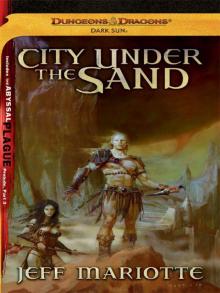 City Under the Sand
City Under the Sand The Burning Season
The Burning Season Sanctuary
Sanctuary Winds of the Wild Sea
Winds of the Wild Sea Serpents in the Garden
Serpents in the Garden Close to the Ground
Close to the Ground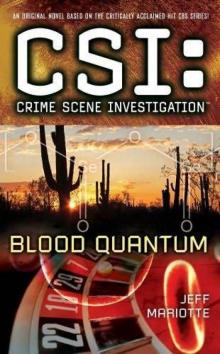 Blood Quantum
Blood Quantum Brass in Pocket
Brass in Pocket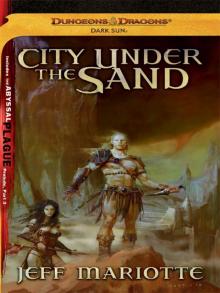 City Under the Sand: A Dark Sun Novel (Dungeons & Dragons: Dark Sun)
City Under the Sand: A Dark Sun Novel (Dungeons & Dragons: Dark Sun)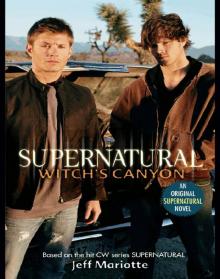 Witch's Canyon
Witch's Canyon STAR TREK: The Lost Era - 2355-2357 - Deny Thy Father
STAR TREK: The Lost Era - 2355-2357 - Deny Thy Father Dawn of the Ice Bear
Dawn of the Ice Bear The Xander Years, Vol.2
The Xander Years, Vol.2 Ghost of the Wall
Ghost of the Wall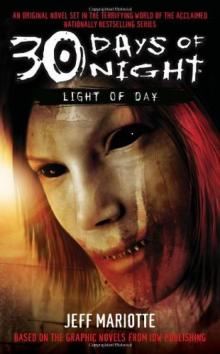 30 Days of Night: Light of Day
30 Days of Night: Light of Day Deny Thy Father
Deny Thy Father Criminal Minds
Criminal Minds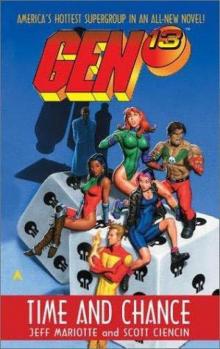 Time and Chance
Time and Chance The Folded World
The Folded World Bolthole
Bolthole Narcos
Narcos Right to Die
Right to Die